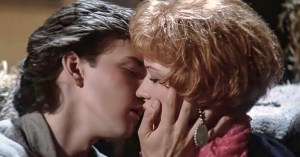Sydney Film Festival: Final Day Competition
Bryan Brown in Beautiful Kate; plus, Peruvian plateaus

Beautiful Kate
Refashioning the return of the prodigal son, Beautiful Kate is a provocatively visual look at family, memory and sexuality. In her debut feature, Rachel Ward has adapted Newton Thornburg’s 1982 novel, transporting this American story in time and place and transforming it into something uniquely Australian.
A family wrested apart by death comes together to gather around its dying patriarch (Bryan Brown). Unwilling to face his family alone, successful writer Ned (Ben Mendelsohn) drags along his latest fling, Toni (a scene-stealing Maeve Dermody), to cushion the impact. Welcomed by his serene yet long-suffering sister, Sally (Rachel Griffiths), Ned is eventually deserted by both women and forced to confront his father and his past, albeit with an alcohol-infused clarity. Pivoting around the compounded loss of his brother (Josh Macfarlane) and his twin (Sophie Lowe), Ned teases out the memories, the anger and his culpability in the event that claimed his beautiful Kate.
Andrew Commis’ cinematography is awe-inspiring. The Flinders Rangers provide the dramatic yet desolate setting that his camera clearly relishes. This cinematic landscape is matched by Ned’s flashbacks, told in an evocative visual style, full of focus pulls and lens flares. His bright but unfocussed memories contrast with the sharp and darkly shadowed dam scene: here not everything is shown, but everything is remembered. This scene must be what has drawn the Bill Henson comparisons — though while it utilises his chiaroscuro style and youthful subjects, being cited alongside this sexual act may only fuel the recent furore surrounding Henson’s photography.
Perhaps Ward has chosen to leave the questions of morality up to the audience and instead focused on exploring the visual themes evoked by stories of sexual awakening and death. She and her amazing crew, led by Mendelsohn’s masterful performance, are clearly giving it their all to bring this story to the silver screen. But while Beautiful Kate is undoubtedly beautiful to look at, the lack of character exploration in a film that feels rushed to conclusion doesn’t come across as cathartic so much as cryptic.

Altiplano
Altiplano is a magical film. From the opening image it displays a striking splendour that only intensifies as the film unfolds. From the high planes of Peru, Altiplano takes the real account of a mercury spill that occurred in the Andean town of Choropampa in 2000 as the departure point for a visual investigation of spirituality, grief and sacrifice.
Peruvian beauty Saturnina (Magaly Solier) is devastated by the loss of her fiancé and seeks revenge against the resident Western communities in the mines and visiting doctors. The ripple effect of these events reaches Belgium, where traumatised photojournalist, Grace (Jasmin Tabatabai), is crippled by her own loss, before finding the courage to reconnect with the world.
Altiplano‘s narrative is really only half the story in what is a profound cinematic and cultural experience. Husband and wife team Peter Brosens and Jessica Woodworth bring us their second feature together after the 2006 award-winning Khadak. As they did in Mongolia, the pair brings their documentary and anthropological sensibilities to Andean communities, capturing indigenous rituals that are all-too-quickly fading away. Their remarkable gift is an ability to infuse the real with the spiritual, and to portray their story through beautiful, cinematic tableaux.
Solier’s stunning face seems to be an inspiration for many of the images. The film revolves around her passionate performance, which is perhaps symbolic of the Peruvian people. “Without an image, there is no story,” Saturnina declares in her climactic scene. On the other hand, Grace and her eye-doctor husband Max (Olivier Gourmet) create windows into this world for the Western audience. “You should read more history, Max,” one of his colleagues wryly comments.
Altiplano is a magnificent warning that we, the audience, should inform ourselves. From Francisco Gozon’s glorious cinematography to Michel Schöpping provocative score and haunting, operatic soundtrack, Brosens and Woodworth succeed in communicating that grief and acceptance — both secular and spiritual — are not unique to the thin air of the high planes, but rather unite people around the world.




